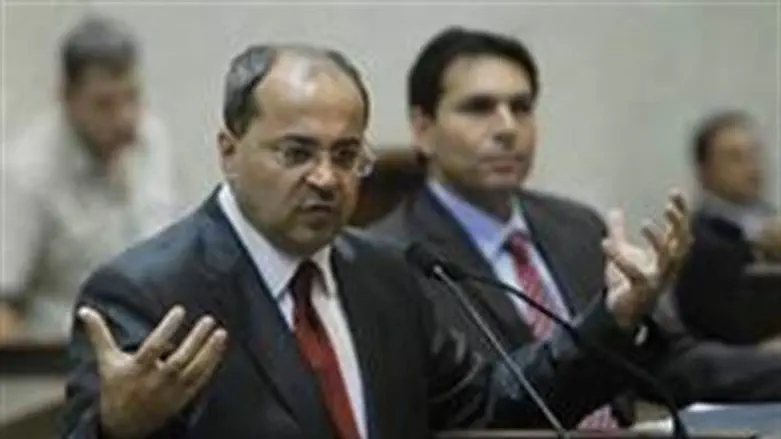
The Knesset’s Ethics Committee decided on Tuesday to suspend Deputy Knesset Speaker MK Ahmed Tibi (Raam-Taal) from chairing any Knesset debates until the end of the current plenary session.
The decision is a punitive act against Tibi, who poured water over the Knesset podium last month, in protest over the approval of the law which legalizes pirate Bedouin settlement in the Negev.
During the heated debated that preceded the vote, the Arab MKs took to the podium one by one and ripped up a copy of the law. Tibi thought this was not enough, however, choosing to rip the paper and then pour water all over it.
According to the office of the Knesset’s Director-General, the incident not only constituted improper conduct on Tibi’s behalf, but also caused actual damage to Knesset property. A letter sent by the office to the Ethics Committee noted that as a result of Tibi’s actions, "the water seeped into the speakers on the podium." Replacing the damaged equipment will cost about 21,000 shekels at the expense of the Israeli taxpayer, noted the Director-General’s office.
The decision to suspend Tibi is a mostly symbolic, however, because the current Knesset session will end within a week.
At the same debate in which the Arab MKs got out of hand, MK Afou Agbaria (Hadash) went even further and, over the Knesset podium, publicly called for an Intifada (violent uprising) because of the law.
In response, Knesset Speaker MK Yuli Edelstein (Likud) filed a complaint with the Ethics Committee.
Edelstein recently told Arutz Shevain an interview that he was “very disappointed” with the Arab MKs’ behavior regarding the Bedouin law. “That’s not how to protest in Parliament,” he said.
During Tuesday’s meeting, the Ethics Committee also discussed the tearing up of parliamentary documents by the other Arab MKs, as well as another, separate incident in which MK Moshe Gafni (United Torah Judaism) tore up a document over the podium.
The Ethics Committee decided this time to reject the other complaints, explaining that the acts were protected under the Freedom of Expression Act. At the same time, the members of the committee warned that future similar complaints may be accepted.
